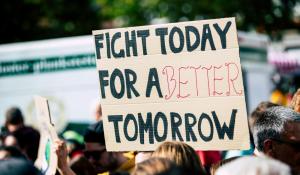.jpg2b68.webp?itok=opSH2kg2)
When deciding on what to make for dinner—maybe grilling burgers or making chicken with a side of veggies—many of us think about how to balance making something affordable, delicious, and healthy. We’re less likely to consider whether child labor is involved in our meals. But increasingly, it likely is.
In recent years, numerous federal investigations have uncovered children working in dangerous conditions to create the food we eat from grocery stores to fast-food chains. Tyson Foods, Perdue, and McDonalds have all been found to have children working in their operations or franchisees. Many of these children are immigrants in precarious positions and unlikely to speak up when they are in danger. They need these jobs to survive, but these jobs put their lives at risk.
Children all over the country, some as young as 10, are working in industries like agriculture, roofing, restaurants, and meatpacking. Their jobs can be so dangerous that some children go to school with chemical burns from cleaning meatpacking facilities or burns from restaurants. In the last two years, at least three children have died on the job. There are an estimated 300,000-500,000 children working in the U.S. agricultural sector alone. From 2015 to 2022, the number of minors employed in violation of child labor laws rose by 283%.
Politicians attempting to roll back child labor restrictions insist that children will benefit from these “opportunities to work,” but the truth is that child labor involves work that is harmful to children’s development or health. The risks include working so many hours that a child falls behind in school and may end up dropping out, cleaning dangerous machinery in a slaughterhouse overnight, or being exposed to hazardous chemicals. Far from preparing young people to have bright and productive futures, child labor hurts children’s potential to live healthy, happy, and successful lives.
And child labor causes harm beyond the children who are directly involved by negatively impacting their future families and communities. It increases the costs of local healthcare, education, and social services, institutions that are inevitably involved in caring for kids who are injured and failing to keep up at school. It also harms the labor market by depressing wages and puts businesses that actually abide by labor laws or ethical practices at a competitive disadvantage. For example, businesses can take advantage of loopholes in federal and state laws, such as “youth wage laws,” that allow businesses to pay children and teenagers less than adult wages for the first 90 days of employment, to increase their bottom line at the expense of children and community well-being.
In recent years, the Department of Labor issued multi-million-dollar fines and carried out investigations that were widely covered in the media, which served as a deterrent. But the new administration, which has vastly different priorities from its predecessor, remains unclear if enforcing child labor laws is a priority and if there will be enough dedicated resources to adequately enforce child labor laws.
States are also backsliding on child labor restrictions enforcement and legislation. In fact, many states are actively working to undermine child labor protections. These states are lowering the ages that children can work in unsafe jobs and increasing the hours they can work each day. According to the Economic Policy Institute, since 2021, 31 states have introduced bills to weaken child labor protections.
Comparatively few states are working to enhance child labor regulations.
Time and time again we have seen companies violate laws and basic rights when they know they can get away with it. While the new administration is sending a clear message that respecting human rights is nowhere on the list of priorities, we can ensure that corporations still feel pressure to prioritize human rights in their operations and supply chains.
Individuals can and have worked together to successfully hold corporations accountable in the past and force them to change their practices. At Green America, our collective work has led to some of the largest corporations ending abusive or harmful practices. Because of our Toxic Textiles campaign and the actions of thousands of consumers speaking up, Carter’s, a leading children’s clothing brand, is adopting a Manufacturing Restricted Substances List (MRSL) to protect workers and communities in its supply chain. And we have seen major wins in our Hang Up on Fossil Fuels campaign thanks to consumer pressure—T-Mobile is now the leader in the industry in the use of renewable energy, reporting 100% renewable energy usage, and AT&T and Verizon are entering into significant contracts for renewable energy.
It is essential that we actively oppose injustices, make our voices heard, and demand change to the harmful status quo. Together, we can ensure that multi-billion-dollar companies, like McDonalds, don’t profit from the exploitation of children. Green America is pressuring JBS, Perdue, Cargill, and Tyson Foods to do their part in stopping child labor.
Making sure you and your family can enjoy delicious meals shouldn’t come at the cost of other children’s lives and futures. While others are trying to make child labor a permanent part of our lives, we can change reality for the better. Together, we can fight for a food system that isn’t built off exploitation but one that creates good and safe jobs.


2395.jpg?itok=Tbg-EsFn)




